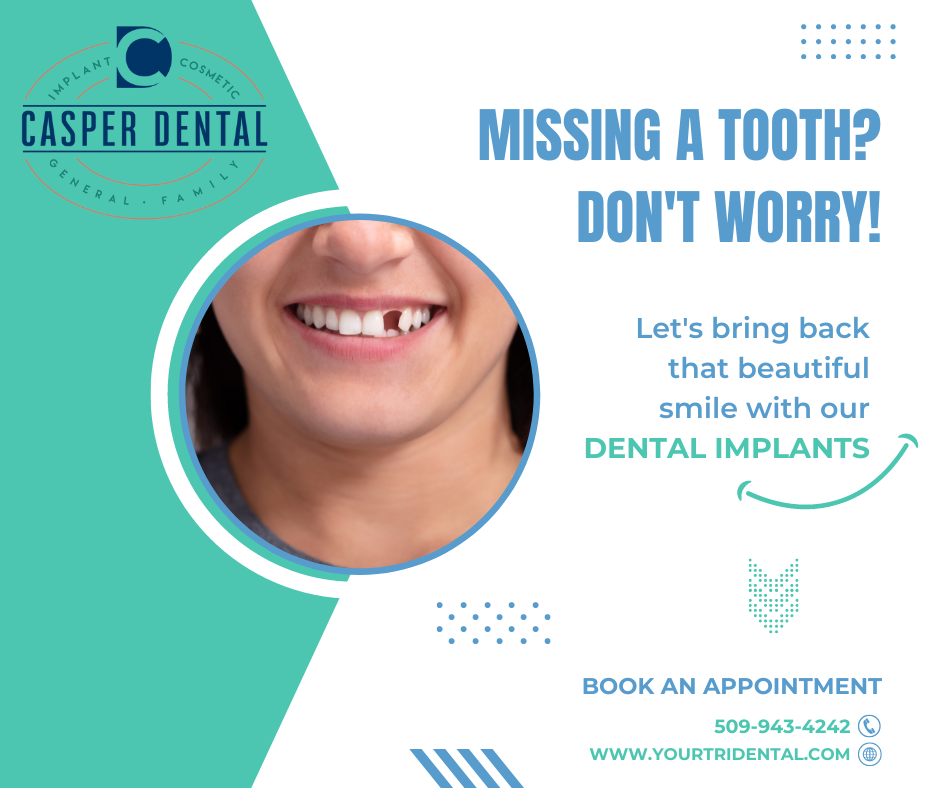Nothing compares to the attractiveness of a full set of dazzling white teeth! That’s why losing teeth can have a significant impact on your oral health, confidence, and the overall quality of your life. Fortunately, dental implants have emerged as a reliable and durable solution for replacing missing teeth. However, prospective patients often have questions regarding the lifespan of dental implants. In this article we will talk in detail about what dental implants are, their most common benefits, how long do they last and what factors contribute towards their longevity. So the next time you visit your Richland family dental clinic, you feel more confident about getting dental implants.
Understanding Dental Implants
Dental implants are prosthetic tooth roots that are surgically placed into the jawbone. Artificial teeth, such as crowns, bridges, or dentures are then attached to these dental implants. Implants are typically made of titanium, a biocompatible material that fuses with the jawbone through a process called osseointegration. This integration ensures a strong and long-lasting support for the artificial teeth. Any tri city dentist like the ones at Casper Family Dental ensures that the process of dental implant placement is as painless as possible.
Benefits of Dental Implants
Dental implants offer numerous benefits that contribute to improved oral health, functionality, and overall well-being. Firstly, they provide a near-to permanent solution for missing teeth, restoring your smile and boosting self-confidence. Nothing shines better and feels better than a complete set of well-aligned, sparkling white teeth.
Unlike removable dentures, implants are securely anchored to the jawbone, offering stability and comfort. This allows for unrestricted chewing and speaking, enabling you to enjoy your favorite foods and engage in social interactions without hesitation. Moreover, dental implants promote better oral health by preventing bone loss and preserving the natural facial structure. They do not require alteration or support from adjacent teeth, ensuring the integrity of your remaining teeth.
With proper care and frequent checkups from your tri city dentist, implants can last for many years, more of which will be discussed in the coming sections of the article. This means that they provide a long-term solution that saves you from the hassle and expense of frequent replacements. Overall, dental implants enhance both the aesthetics and functionality of your smile, positively impacting your overall quality of life.
How long do Dental Implants Last?
With proper care and maintenance, dental implants can last between 20 to 30 years, and in many cases, a lifetime. According to research studies, the success rate of dental implants after ten years is approximately 90-95%. However, it’s important to note that individual experiences may vary based on the different factors that are discussed below.
Regular dental check-ups and professional cleanings are essential for monitoring the health of implants. Dentists can detect early signs of complications and provide timely intervention to prevent further damage. X-rays and comprehensive examinations help identify potential issues before they become severe.
Factors that Impact the Longevity of Dental Implants
Just like your natural teeth, artificial teeth also require proper care and attention. Here are a few factors that directly impact the lifespan of dental implants:
-
Oral Hygiene
Maintaining good oral hygiene is crucial for the longevity of dental implants. Regular brushing, flossing, and professional cleanings help prevent the buildup of plaque and bacteria, which can lead to peri-implantitis, a condition that may compromise the stability of the implant. Using antimicrobial mouthwashes can further reduce the risk of infection.
-
Use of Tobacco
Tobacco use, particularly smoking, is strongly associated with implant failure. Smoking impairs blood circulation and slows down the healing process, making smokers more susceptible to infections and implant complications. While it sounds hard to do but quitting smoking can significantly enhance the lifespan of dental implants.
-
Jawbone Quality and Quantity
Sufficient bone volume and density are prerequisites for successful implant placement. In cases of inadequate bone, additional procedures such as bone grafting or sinus lifts may be necessary to enhance the implant’s stability. Maintaining good oral health and seeking timely treatment for tooth loss can help preserve the jawbone and minimize the need for additional procedures.
-
Biting & Teeth Grinding
Excessive force exerted on implants due to parafunctional habits like biting and teeth grinding (bruxism) can lead to implant failure. Using nightguards or occlusal splints can help protect the implants and prevent damage caused by these habits. If you actively participate in sports and activities that have a high risk of facial injury, don’t forget to wear a mouth guard to protect your implant.
-
Dental Visits
Lastly, it is crucial to schedule regular check-ups with your dentist to monitor the health of your implants and ensure optimal oral hygiene practices.
Remember to choose Casper Family Dental, a Richland family dental service that offers free consultations and hassle-free dental procedures for your peace of mind.


